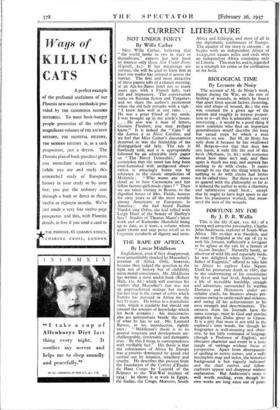Englishmen, even if they disapproved, were unjustifiably shocked by Mussolini's
invasion of Africa. Only, however, because they judged the question in the light not of history but of childishly naive moral consciences. Mr. Middleton has written a most useful book (Robert Hale, ios. 6d.) which will convince his readers that Mussolini's feat was not an unprecedented outrage but merely the last step in the career of crime which Europe has pursued in Africa for the last 70 years. He writes in a journalistic style, which is readable but should not conceal the amount of knowledge which his book contains ; his inaccuracies also are unimportant beside the truth of what he has to say. Mr. Leonard Barnes, in his introduction, rightly says : " Middleton's thesis is in its general structure and development un- challengeably, intolerably and damnably true. By this I mean in correspondence with verifiable fact." His thesis is that the colonisation of Africa by Europe was a process dominated by greed and carried out by injustice, treachery and cruelty. He describes this process from the foundation of the Comite d'Etudes du Haut Congo by Leopold of the Belgians to the Wal-Wal incident of 1934 : he shows it at work in Egypt, the Sudan, the Congo, Morocco, South
Africa and Ethiopia, and most of all in the diplomatic conferences of Europe. The squalor of the story is extreme : it begins with an independent Africa of 10,230,000 square miles and ends viith an independent Africa consisting only of Liberia. This may be, and is, regarded as a triumph for crime or for civilisation or for both.


















































 Previous page
Previous page